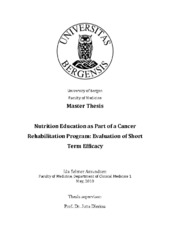Nutrition Education as Part of a Cancer Rehabilitation Program: Evaluation of Short Term Efficacy
Master thesis
Permanent lenke
https://hdl.handle.net/1956/17907Utgivelsesdato
2018-06-22Metadata
Vis full innførselSamlinger
Sammendrag
Background and aim: The rising number of cancer patients is being followed by increasing number of cancer survivors in Norway. Modifiable lifestyle factors such as changing dietary behaviour can benefit the cancer prognosis and reduce the risk of recurrence. However, changing people’s behaviours is complex. The Cancer Centre for Rehabilitation and Education (KOR) at Haukeland University Hospital (HUS) in Norway offers a one-day nutrition course to educate cancer patients and survivors in regards to nutrition and cancer. However, the program has never been formally evaluated. The aim of this study was to evaluate the efficacy of the one-day nutrition course on patients’ dietary knowledge and short-term dietary behaviour. Method: A quality control pilot study was conducted at KOR from October 2017 to February 2018 including outpatients diagnosed with cancer and cancer survivors attending the one-day nutrition course. Disease-related information and anthropometric measurements, the patients’ satisfaction with current diet, and their motivation to change diet were documented through a self-reported personal questionnaire. Dietary knowledge and dietary intake were measured before and after attending the nutrition course, by the use of a dietary questionnaire and a 3-day food diary, respectively. The results from the dietary questionnaire and 3-day food diary before the course are compared to the answers and food diaries after the course. Results: The study population consisted of 28 patients (50% males), mean age 64 years, mainly prostate- (41%) and female breast (33%) cancer patients, and the majority of the group were currently receiving treatment (82%). 75% of the patients wanted to change their dietary behaviour. 20 of 26 patients scored higher in terms of knowledge after attending the nutrition course. The 3-day food diary showed that patients increased their protein intake with approximately 2.5g per 1000 kcal (47.9±7.7 to 50.4±7.7) and also increased their fibre intake with 2.2g per 1000 kcal (12.3±3.3 to 14.5±3.7), which showed a significant difference (0.028, p<0.05). The mean %energy intake from saturated fatty acids decreased (13.4 ± 2.6 to 11.1±3.4, p=0.54). Conclusion: The results of the pilot study show that the one-day nutrition course has efficacy on dietary knowledge and short-term dietary intake in cancer patients attending the course. The main results of the pilot study reflect the course content, both in terms of increased dietary knowledge and positive changes in dietary intake.
